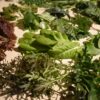Homemade natural (herbal) toothpaste
We brush twice a day (if we are good), and often swiggle and gargle too. But what exactly is in your toothpaste and your mouthwash? The big question around fluoride is quite big in the media today, and even if your conventional paste is fluoride free, it may contain other ingredients which, as a natural-health minded person, you’re not going to be too happy with.
If you have moved to a more natural lifestyle, chances are that many of your daily hygiene products have been traded in for an organic, natural and/or herbal alternative. Hopefully so has your toothpaste and mouthwashes. If not, the following might inspire you to at least think about the wonderful options that exist!
We have, at a herb group meeting, created our own basic baking soda toothpaste, and after a week of using it (instead of my already advertised as “natural product” toothpaste), I’m happy to report that I totally love it! Here’s the recipe we used, and some notes on other herb plants and natural materials that may be good for herbal oral healthcare.
Basic Baking Soda Toothpaste
- 4 tsp Baking Soda
- 1 tsp Salt (finely ground sea salt or Himalayan rock salt)
- few drops of water*
- 1-2 drops essential oils (e.g. peppermint, orange, cinnamon, clove, vanilla etc) (optional)
Mix dry ingredients together and add enough water to form a smooth, thick paste. Add essential oils if using and mix through. Can be stored for up to 1 month.* I used coconut oil to make the paste instead of the water, and although it gets a bit harder in the cold (coconut oil for those who don’t know solidifies at colder temperatures), I still prefer it to just using plain water.
Other herbs and natural remedies for mouth and dental care include:
- Propolis (produced by bees) promote general oral health
- Xylitol (an all natural sweetener made from corncobs and birch trees) is plaque fighting
- Apple cider vinegar diluted makes an antiseptic mouthwash
- Myrrh(Commiphora molmol) is antimicrobial and astringent, killing plaque causing bacteria and tightening gums
- Chamomile (Anthemis nobilis) is useful to decrease gum inflammation
- Strawberries (Fragaria spp) have a slight bleaching action to whiten and brighten teeth
- Thyme (Thymus spp) is an effective antiseptic mouthwash (also Rosemary (Rosmarinus officinalis) and Sage (Salvia officinalis))
- Mint (Mentha spp), especially spearmint and peppermint pleasantly freshens breath (also Parsley (Petroselinum crispum))
- Dill (Apium graveolens) or Fennel (Foeniculum vulgare) seeds can be chewed to sweeten breath (and allay hunger)
- Clove oil (Syzigium aromaticum) soothes toothache
- Plantain (plantago spp) can be used fresh for abscesses and inflammation
- Calendula (Calendula officinalis) and echinacea (Echinacea) sooth sore gums and promote healthy immune systems
- Liquorice root (Glycyrrhiza glabra) is antibacterial, anti-cavity and reduces plaque
- Goldenseal (Hydrastis canadensis) makes an anti-inflammatory, antiviral and antibiotic mouthwash
- Horsetail (arvense) is rich in vitamins and minerals and can help heal infections and decrease bleeding of gums
Other herbs mentioned for oral health include grapefruit seed extract, neem (Azadirachta indica), Oregon grape root (Mahonia spp), Tea Tree (Melaleuca alternifolia) and Aloe vera. For an all natural toothbrush, try bay, eucalyptus, fir, oak, or juniper twigs; or the roots of alfalfa, mashmallow, liqourice and horseradish.
References:
- North Shore Herb Group, Auckland New Zealand
- Mother Earth News (http://www.motherearthnews.com)
- How Stuff Works (http://health.howstuffworks.com)
- Herb Quarterly (http://www.herbquarterly.com)
- Consumer Guide to Dentistry (http://www.yourdentistryguide.com)



